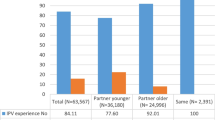Abstract
Mixing of sexual partners as part of the profession of female sex workers (FSWs) can be a risk in intimate partner relationship, which is primarily based on love and affection. Sexual relation with one partner provides emotional and psychological support. However, when it is a web of partners, it often results in unprotected sex, consequently creating a pathway for disease and increasing the vulnerability of FSWs to sexually transmitted infections (STIs). This paper analyses the subtleties of sexual behavior of FSWs and their vulnerability toward STIs in intimate partner relationship in South Asian countries. The basic data used in this paper have been taken from 3 countries, 1271 FSWs from Bangladesh, 1404 FSWs from Nepal, and 7399 FSWs from India. The data were collected through modified time location cluster sampling as a part of mapping and size estimation of most-at-risk populations (MARPs) in Nepal and key affected populations (KAPs) in Bangladesh during the period of 2010–2016. The data for India are taken from the integrated behavioral and biological assessment (IBBA), which assesses the prevalence of high risk population in India. The findings reveal that the majority of the FSWs were married, which reveals dynamics of sexual activity placing them at higher risk of STIs. About half of the FSWs had more than 15 coituses in the last 30 days in Nepal, which is a high risk factor. Unprotected sex is reported high across all three countries irrespective of all background characteristics. Condom use during intercourse in Bangladesh is less likely in older FSWs and more likely among educated FSWs who had coital frequency of 7 or more in the last 30 days. Interestingly, unmarried FSWs in Nepal are less likely to use condom in their last sex as against India where FSWs are more likely to use condom in their last sex. The prevalence of STI among uneducated FSWs is found higher in Bangladesh as compared to Nepal and India. The socio-demographic background characteristics showed a significant association with unprotected sex, coital frequency and prevalence of STI across all three countries.
Similar content being viewed by others
References
Bardhan, K. (1986). Women: Work, welfare, and status: Forces of tradition and change in India. South Asia Bulletin, 6(1), 3–16.
Caldwell, J. (1982). Theory of fertility decline. London: Academic Press.
Commission on AIDS in Asia. (2008). Redefining AIDS in Asia: Crafting an Effective Response. Report of the Commission on AIDS in Asia. Oxford University Press.
Geeta Rao. (2000). HIV and intimate partner transmission: A call for action. In Symposium report.
HIV Transmission In Intimate Partner Relationships In Asia. (2009). UNAIDS/09.30E – JC1759E (English original, August 2009)
HIV and Intimate Partner Transmission. (2009). A call for action 9th international congress on AIDS in Asia and the Pacific symposium report Tuesday.
Mathema, M. (1998). Women in South Asia: Pakistan, Bangladesh, and Nepal. In N. P. Stromquist (Ed.), Women in the third world: An encyclopedia of contemporary issues (Vol. 760, pp. 583–592). New York, NY: Garland Publishing.
Morison, L., et al. (2001). Commercial sex and the spread of HIV in four cities in sub-Saharan Africa. AIDS, 15(Suppl 4), S61–S69.
Moses, S., et al. (2006). AIDS in South Asia. Washington, DC: World Bank.
NCASC. (2011). Integrated Biological and Behavioural Surveillance Survey among Female Sex Workers Kathmandu Valley, 2008, Round III.
Pessar, P., & Mahler, S. (2003). Transnational migration: Bringing gender in. International Migration Review, 3, 812–846.
PrasadaRao, UNAIDS Regional Support Team for Asia and the Pacific, quoting Decker (2009) Intimate partner violence is both a risk marker and a transmission mechanism for women’s HIV infection: Findings from a national population-based sample of Indian husband-wife dyads. J AIDS.
Report on HIV/AIDS Programme WHO. (2012). Prevention and treatment of HIV and other sexually transmitted infections for sex workers in low- and middle-income countries recommendations for a public health approach. ISBN 978 92 4 150474 4
Rodrigo, C., & Rajapakse, S. (2009). Current Status of HIV/AIDS in South Asia. Journal of Global Infectious Diseases, 1(2), 93–101. doi:10.4103/0974-777X.56249.
Singh, S. K., Malviya, A., Pandey, V. V., Sharma, S. K., & Sharma, N. (2015). Patterns of sexual mixing and STIs in intimate partner relationships among female sex workers in Nepal. Journal of AIDS & Clinical Research, 6, 531. doi:10.4172/2155-6113.1000531.
Wee, S., Barrett, M. E., Lian, W. M., Jayabaskar, T., & Chan, K. W. (2004). Determinants of inconsistent condom use with female sex workers among men attending the STD clinic in Singapore. Sexually Transmitted Infections, 80, 310–314.
Zaidi, A. K., Awasthi, S., & deSilva, H. J. (2004). Burden of infectious diseases in South Asia. BMJ, 328, 781.
Author information
Authors and Affiliations
Corresponding author
Ethics declarations
Conflict of interest
All the authors declare that they have no conflict of interest.
Ethical Approval
All procedures performed in studies involving human participants were in accordance with the ethical standards of the institutional and/or national research committee and with the 1964 Helsinki declaration and its later amendments or comparable ethical standards.
Informed Consent
Informed consent was obtained from all individual participants included in the study.
Rights and permissions
About this article
Cite this article
Singh, S.K., Sharma, B., Sharma, S.K. et al. Influence of Profession as Risk of STIs in Intimate Partner Relationship in South Asian Countries. Sexuality & Culture 22, 148–161 (2018). https://doi.org/10.1007/s12119-017-9457-3
Published:
Issue Date:
DOI: https://doi.org/10.1007/s12119-017-9457-3




